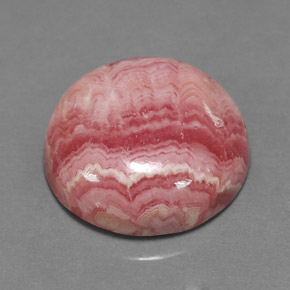The Gemstone Rhodochrosite

Rhodochrosite has a lovely natural pink to red color. Rhodochrosite gemstones are primarily translucent to opaque banded beads and cabochons. These bands are often in concentric or zigzag patterns of alternating white and pink (or red) colors. The transparent red forms large enough to be cut into gemstones are extremely valuable and cherished by rare gemstone connoisseurs.
Mineral Class
?
Rhodochrosite
Additional Properties
|
Refractive Index
?
1.60 - 1.82 |
Double Refraction
?
-0.22 |
Transparency
?
Transparent to nearly opaque |
SG
?
3.0 - 3.3 |
Luster
?
Vitreous |
| Cleavage ?
1,3 - rhombohedral |
All About
Though Rhodochrosite has a very pretty color, it is not a durable gemstone because of its low hardness. It is easily scratched, and care must be ensured to preserve it. Much of the
banded form of Rhodochrosite comes from Argentina, where
the Rhodochrosite forms as
stalagmites and
stalactites in ancient Inca
Silver mines and
caves.
Uses
?
Banded Rhodochrosite is used as beads for bracelets and necklaces, and may also be cut and
polished into
cabochons. The rare and transparent deep-red form is very difficult to obtain, and is occasionally cut into a rare and exotic collectors gemstone
Treatments & Enhancements
?
Rhodochrosite gemstones are not treated or enhanced.
Rhodochrosite Sources
?
Most gemstone Rhodochrosite originates in Catamarca, Argentina. The Sweet Home Mine in Colorado and the Wudong Mine in China have produced
gemmy clear Rhodochrosite. Other sources include South Africa, Peru, and Japan.
Similar Gemstones
?
Rhodonite is much harder and usually contains black banding, and
Thulite is harder.
Rhodochrosite in the Rough Photos
?